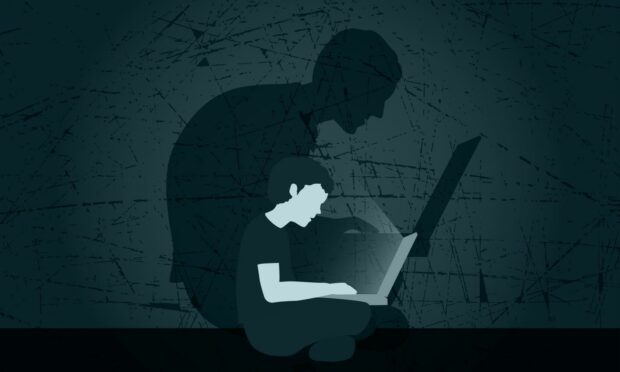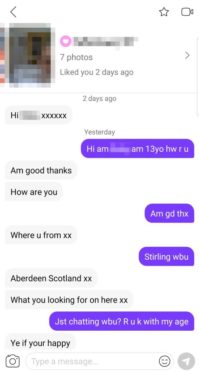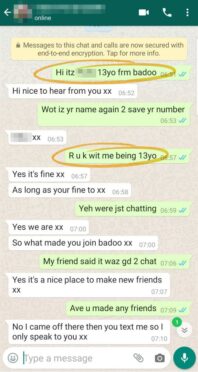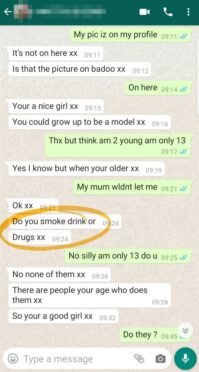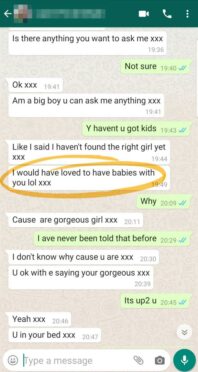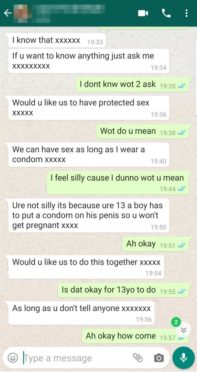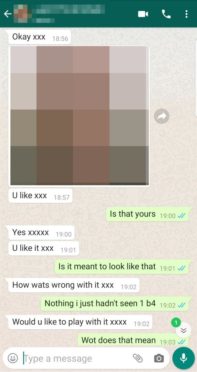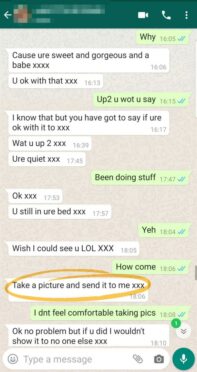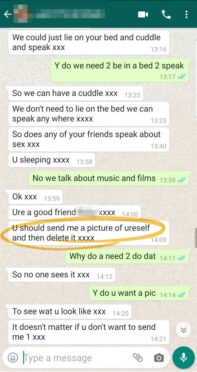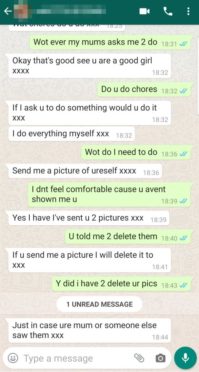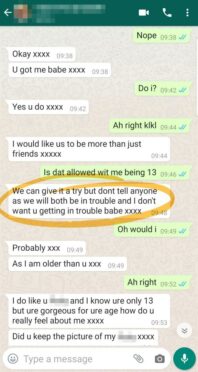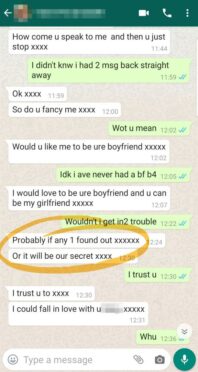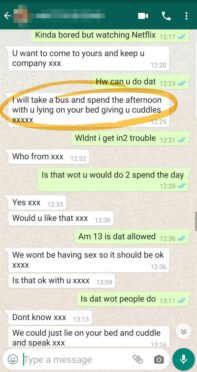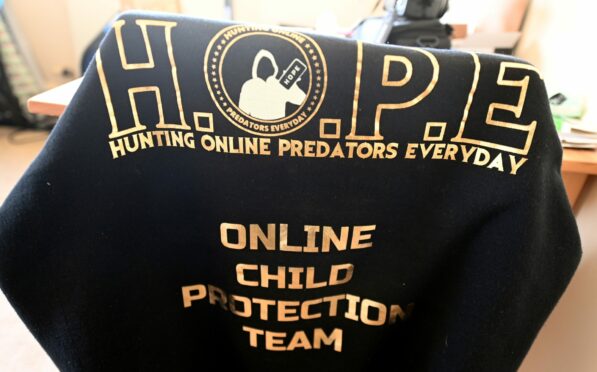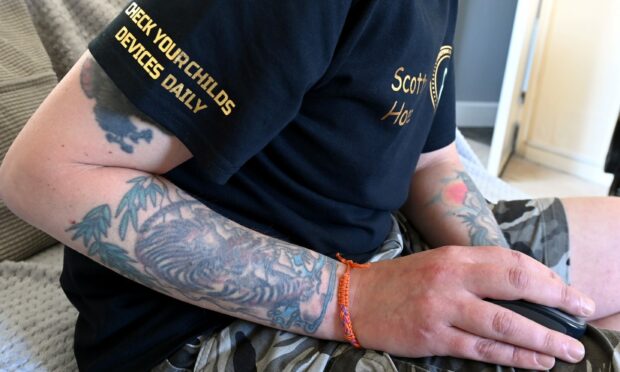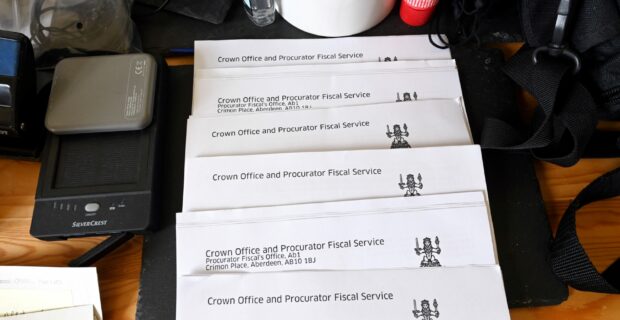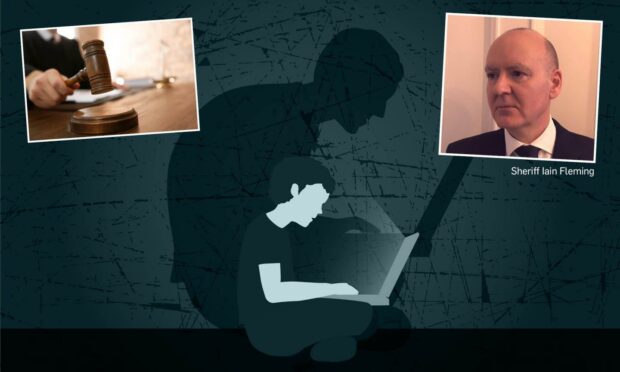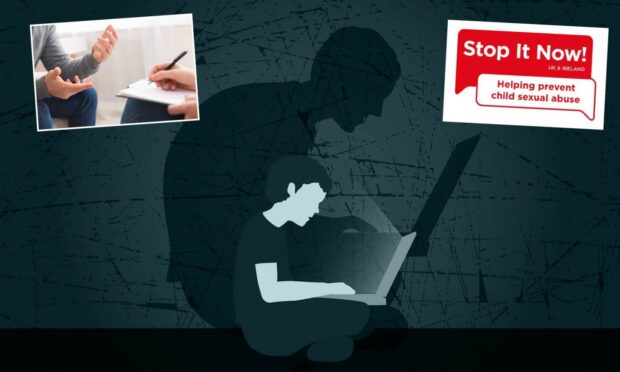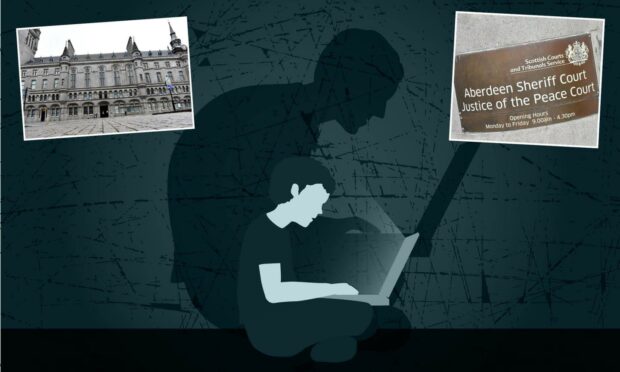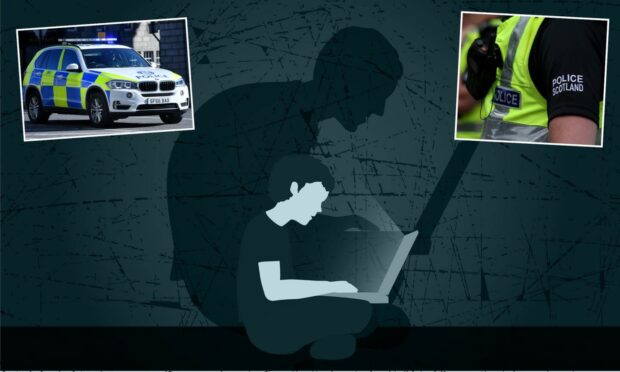By day they’re ordinary shop workers, bus drivers and carers, but in their free time they set up online profiles posing as children in order to snare internet predators.
In a new investigation, we looks at just what paedophile hunter groups are, who they are, how they work, what motivates them, and also the issues some people have with them.
In an exclusive interview, Scotty Hope, not his real name, tells how he helped co-found a group called Hunting Online Predators Everyday (HOPE), an organisation of volunteers who look to seek out individuals online who are speaking inappropriately to minors.
He gave us access to stomach-churning chat logs which reveal the disturbing reality of how predators contact and attempt to groom what they believe to be a young child.
A sting explained – how they do it
Scotty said: “Having created a profile online of a child, we then wait to be approached.
“Some of them will start with a basic ‘hi, what you up to?’, others just launch straight into ‘hey gorgeous’, ‘hey sexy’ or even ‘would you like to see my ****?’ – and that sometimes is the first contact.”
Scotty said: “We make clear the age we are purporting to be.
“It’s not really a legal requirement to have the age so many times. We do it just so the defence can’t turn round and say they never noticed that comment or misread it.
“We’ll throw it in casually just as a reminder and so they can’t say ‘we never noticed’.
“Quite often they’re looking for vulnerabilities. Through general chitchat they’re looking for things like the parents of the child being particularly strict, that they hate their mum, they hate this and that.”
Talk turns sexual
Scotty explained at some point in the conversation, the predator will begin to make the chat more sexual.
He said: “It varies from predator to predator and depends on how comfortable they feel with that child.
“He’ll branch into it and then pull back again and not mention anything sexual for a while. And then branch into it again, almost like he’s normalising it and start going into it more and more.
Graphic images
“It does get graphic, and sometimes it can be horrific.
“They all want pictures, that’s really common.
“Sometimes they’re really demanding.
“In my experience, the ones that are demanding are generally the ones that have done this before and been caught, or follow what we do and are being very careful.”
Scotty added: “It’s sinister. They are encouraging a minor to lie.
“They’ve told her to keep it a secret. We actually love it when that happens because they can’t then say ‘well I didn’t know’.
“Why would you tell a random person of age to keep it a secret and not tell their mum or anybody else?
“We prefer it when the predator wants to meet because then they really can’t get out of it and we can use common law to hold them.
“We don’t like to do it on too short a chat log. Sometimes it takes a good few months.

“Once we’ve got all the stuff together, that’s generally when we go for them.”
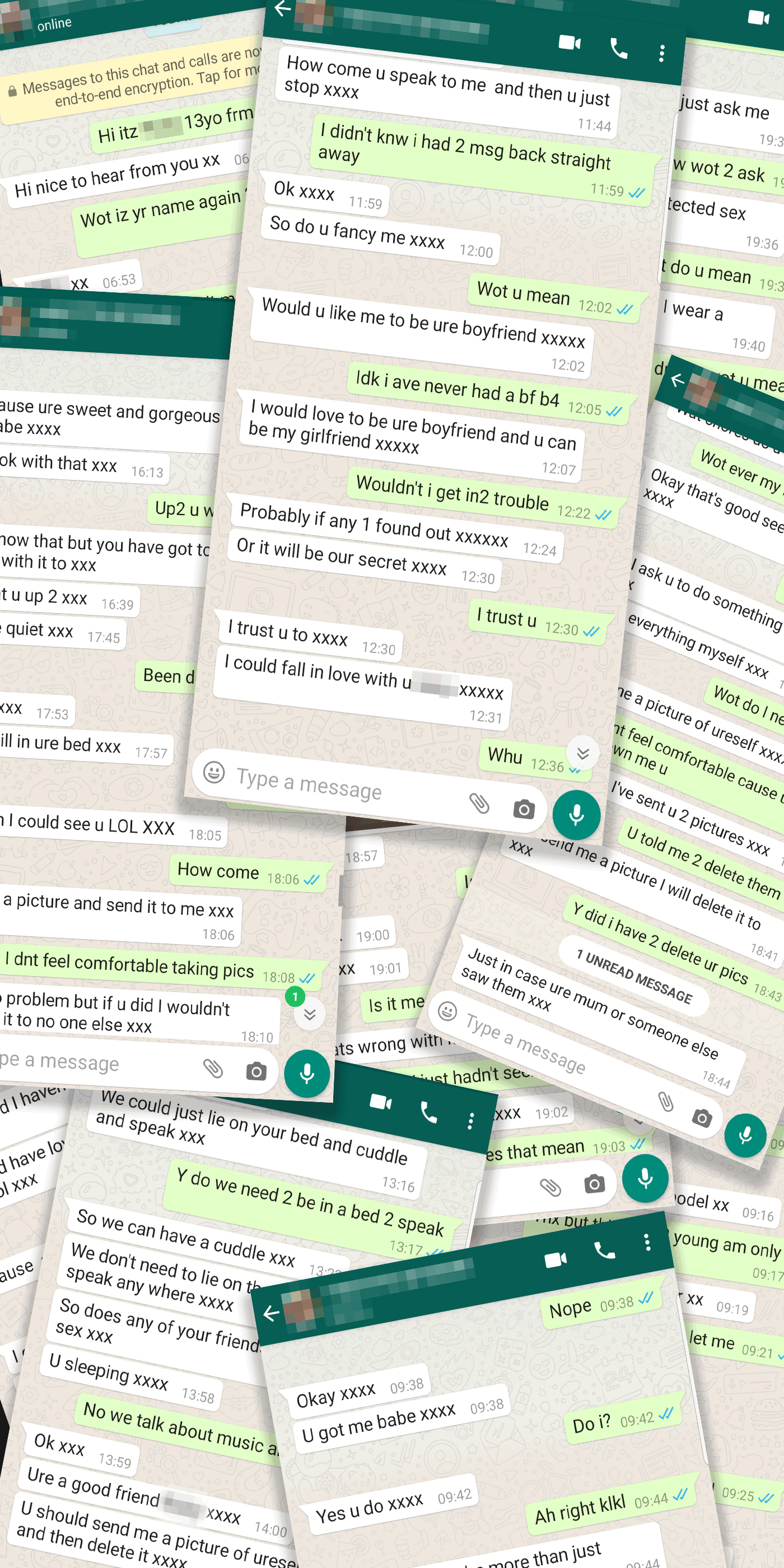
15 to 20 stings going on at once
Scotty explained that, while HOPE volunteers are all extremely busy, he still thinks they are not even “scratching the surface” of the problem.
He said: “We’re very busy. We’ve got, at the moment, seven decoys and they can be chatting to up to four or five predators each at any one time.
“You just have to watch Facebook. In our community, on any given weekend, there are 15 to 20 stings going on throughout the UK.
“I do believe that we’re not actually scratching the surface of the problem. It’s huge, it’s everywhere.
“The decoys will put their location, but they could be chatting to anyone, from all over the UK, it’s just who approaches the decoy.
“We’ve seen, of late, quite a lot in this area. I’m sitting with seven, eight or nine witness availability letters. That’s just ones that we’ve caught in the last six months or so.
“It’s getting worse. I don’t think the sentencing helps because they now realise they’re not getting anywhere near what they should be getting.
“We would be hoping for jail and some sort of bigger deterrent, but quite often they just get off with community payback orders and a sex offenders course.
“We’ve had to take on more decoys to cope with the workload.
“It could just be that they’ve always been there and just gone unnoticed, and now that they’re being highlighted it’s just more apparent.”
Scotty said another big part of what HOPE does is “safeguarding”, involving trying to protect children from abuse as it happens.
He explained: “That involves sitting on live apps and they’ll stop grooming as it happens.
“Quite often children will be streaming something silly like their latest toy, and in the live comments you’ll get predators saying ‘lift your top up’, ‘pull your shorts down’, etc.
“The safeguarder will be right in there saying ‘no, don’t do that, don’t listen to this guy, he’s a bad guy, you want to block him’.
“The safeguarder will try and find the parents and get in touch.
“I can’t stress enough to people to check their kid’s devices and find out who they’re talking to. You just don’t know. These guys don’t come with stamps on their head, they can be literally anybody.”
Concerned parents can contact HOPE via the group’s Facebook page for advice.
Scotty added: “The safeguarders also do other things like safeguard actual predators. Some of them have got learning difficulties and have the mental capacity of a 14-year-old even though they’re in a 30-year-old body.
“This has become a huge part of how we operate. We won’t go out if we think there’s a safeguarding risk. We’d sooner hand our evidence in to the police and social services.”
Scotty explained how he first became involved.
Scotty said: “I’m a parent. Back in 2017 I stumbled across a team called Shadow Hunters. It just randomly popped up on my Facebook.
“I watched and then I started doing some investigation myself as to how rife this actually is online.
“I replied to an advertisement and became a decoy, so I’ve decoyed as well as doing the hunting side of things and helping run our team.”
Groups don’t like being branded ‘vigilantes’
While group members get involved voluntarily, exposing themselves to frequent, graphic conversations with predators discussing child abuse can still take its toll on their mental health.
Scotty said: “Me personally, I seem to have the ability to just block it out. Everybody has their own coping mechanism and within the team we have a good support network with each other.
“We have separate group chats, one for the serious stuff about what’s going on with decoys, and a banter chat where we just go and speak rubbish.
“That’s a good coping mechanism and it’s a good break away.
“Me personally, I play my Xbox when I want to tune out.”
Paedophile hunter groups are often referred to as “vigilantes”, but it’s not a term groups like.
Scotty explained: “I think if most people were asked to describe a vigilante, it would be somebody that takes the law into their own hands, with complete disregard for the law.
“If I was a vigilante, I wouldn’t be pointing a camera in a predator’s face and gathering evidence, he’d be lying in a pool of his own blood.
“To me, vigilantes are a mob with weapons, creating a complete and utter scene.
“We have total regard for the law, because if we don’t our cases don’t make it to court, so we have to make sure we’re following the law to the letter.
“I think there’s a clear difference between vigilantes and a group of volunteers who are acting in the best interests of children.”
While Scotty and his team set out to expose child predators and bring them to justice by alerting law enforcement, charity Stop It Now! Scotland advocates a different approach.
Stuart Allardyce, director of the charity, which is dedicated to the prevention of sexual abuse of children, said: “Working with those who are at risk of causing harm to children and young people is one of the most effective ways to prevent abuse before it happens.”
For HOPE members, hunting predators is something they juggle with their full-time day jobs.
Scotty said: “I work full-time, I do 45 hours, 50 hours a week sometimes in my own job and then I’m doing this on the side.
“I’m in management in retail, we’ve got another member who’s a care worker, another one who’s a bus driver, there are various roles.
“I get home about 10pm and I’m still up at about 2am or 3am, depending on what we have to do.
“I might be reviewing some chat logs to make sure that the decoys haven’t led anybody, I could be organising a sting, I could be trawling through Google Maps trying to find somebody’s house, or trawling through census records, electoral rolls.
“One time the guy had taken a photo inside his van, and the wing mirror showed the house across from his, and we were able to identify where he stayed from that.
“Once we found the area, we were trawling Google street maps for about 10 hours trying to find it.”
Scotty accepted the public perception of groups such as HOPE is mixed, with some very supportive and others taking a dimmer view and questioning the legality of it.
He said: “Just from reading comments, there are a lot of people who really like what we do.
“Recently we did a sting out in Turriff where the neighbours were coming out with coffee and letting us use their toilets.
“From that point of view, the response has been really good, but you read comments like ‘you guys have no right to do this’, ‘this should be left to the police’, ‘you guys are breaking the law by doing this’.
“I think it’s very mixed and I think a lot of people misunderstand what we do as well.”
Don’t take the law into your own hands
Police have also urged groups not to take the law into their own hands and risk creating a hostile situation when confronting a predator, which is often live-streamed on social media.
Scotty said: “I get their concern, however, a lot of the people that we catch would never, ever come across the police’s radar.
“We’re actually changing the way we operate whereby we’re going to stop live stinging.
“Instead we’re going to opt to stream into a private group, which we do sometimes anyway, especially if we have concerns over whether the person’s got severe learning difficulties, or if there’s a question of a safety issue, maybe there are kids in the house.
“We’ll stream into a private group that only other decoys and hunters have access to, and then we will release the footage upon conviction.
“We recently did one in Aberdeen and as we approached the property he actually left to go to the shops with his 15-year-old daughter, so right away we knew she would be in the property and the decision was made we’d stream into a private group.
“When we approached the door, once they were back, and he came to the door I told him who I was and why I was there. As soon as he heard ‘Hunting Online Predators Everyday’ he was about to walk away back into the house and close the door on us.
“However, I managed to get in ‘look, we’re not livestreaming on Facebook, this is going into a private, closed group, nobody in the public will know’ and at that point he stopped and about turned and spoke to us.
“It became apparent that he was more scared of being livestreamed on Facebook than he was about anything else, and that, I think, is quite apparent in a lot of predators.”
Scotty, who has since left the group, says that although the morals of decoy groups are sometimes questioned, the cause they fight for is a noble one.
He said: “A lot of people in the community are survivors of child abuse themselves and maybe didn’t quite get the justice they wanted or needed, and so by doing this they’re getting justice for other children.”
